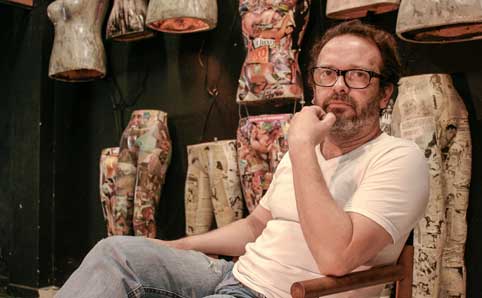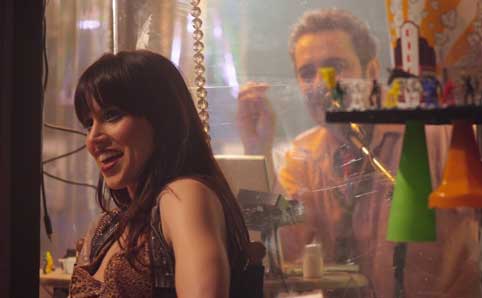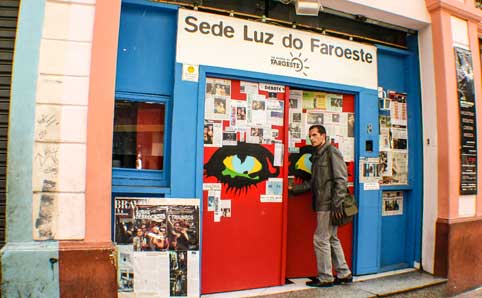
In a city so full of contradictions, it’s unsurprising to find one of the most striking areas of São Paulo also one of its most run-down. During the day, that area comes close to embodying its name, Luz (‘light’), but at night, a darker world comes to the fore. Luz has been a meeting point for the city’s crack addicts since the 1990s, earning it the moniker ‘cracolândia’ – crackland.
Several attempts have been made to revitalise the area, including the remodelling of the glorious Pinacoteca art museum in the 1990s, as well as the Centro Júlio Prestes (formerly the Estação Júlio Prestes), home to the stunning railway-station-turned-concert-hall Sala São Paulo, which reopened in 1999. But those who assume the 1990s to have been the beginning of the area’s decline are mistaken.
Luz’s Rua do Triunfo used to be known as the ‘Boca do Lixo’ – loosely translated as ‘trash alley’. The red-light zone was at heart of the city's film industry in the 1950s, when directors rubbed shoulders with an underbelly of criminals, prostitutes and other interesting types.
And it’s precisely where the Cia. Pessoal do Faroeste theatre company has been based for the past fifteen years, recreating Luz’s history on stage. ‘We call ourselves “The Western People’s Theatre Co.” because this is a kind of Wild West,’ explains Paulo Faria, the company’s director.
‘It’s the epitomy of the genre – a place where there are no laws, and where the occupation of the urban space is completely disorderly. Thinking back to the way we got here, there couldn’t be a better metaphor. And at the same time, the fact of our being here at all is important in drawing attention to the area.’ Faria hastens to clarify that though the neighbourhood undoubtedly has a darker side, the theatre company’s role there is far from being a charitable one, but is rather ‘an amazing story of living the history of cinema’.
 |
| Paulo Faria, actor, playwright and the director of the theatre group |
The particular slice of Centro’s history on which the group focuses is rooted in the immediate environs of Rua do Triunfo. At the same time, as the theatre critic Sebastião Milaré stated at a series of research events run by Pessoal do Faroeste in 2011, ‘Boca do Lixo is just a tiny part of the area – but a tiny piece that was so important that it affected everything in its vicinity.’
As an integral participant in the cultural movements that inhabited the area in the 1970s, Milaré says that in Boca do Lixo, ‘there was a willingness, even amongst filmmakers, to dive head first into experimentalism’. Experimentalism, it’s fair to say, is the order of the day at the Cia. Pessoal do Faroeste.
The theatre group’s productions to date have been reflections on two remarkable periods, both of which demonstrate the powerful role art can play in processes of urban change. In the 1940s, Rua do Triunfo was a stronghold for film distributors of the likes of Warner, Paramount and Universal.
To help keep distribution costs down, they needed to be close to railway stations, so they set up around Rua do Triunfo and Rua General Osório, in the vicinity of Luz and Sorocabana railway stations (the latter is now Estação Pinacoteca, a secondary space belonging to the Pinacoteca art museum).
Boosting commerce in the region more generally, their presence also served as a magnet for local film studios and production companies, which eventually followed the distributors to Luz. Of all the films released between 1960 and 1980 in Brazil, 80 per cent were produced in the Boca do Lixo. And of all the genres that emerged, softcore porn (‘pornochanchada’) was for some one of the area’s high points – and, for others, the last nail in its coffin.
Fast-forward to the 2000s, and we see a similar scenario not far away, at Praça Roosevelt, which since the arrival of the Os Satyros theatre company in 2005, has become a hub for the city’s alt. theatre scene, flanked by a clutch of thespian-packed bars, restaurants and, to this day, brothels.
 |
| Mel Lisboa in a Cine Camelão production |
‘We want to involve local residents in the urban guerilla effort in Luz,’ says Faria, of the Pessoal do Faroeste’s ambitions. ‘In some ways, it’s like what happened at Praça Roosevelt, where Os Satyros were fundamental in defining the area’s identity.’
The Cia. Pessoal do Faroeste’s productions start to take shape early on in the company’s research process. The 2011 play Cine Camaleão: Boca do Lixo, starring the Rio actress Mel Lisboa, was nominated for Shell Awards in three categories. The play shed comical light on the Boca do Lixo of the 1970s pornochanchada era.
And in May, the company goes even further back in time with the play Homem Não Entra which, set in 1953, re-interprets the then mayor Jânio Quadros’s decree to expel the prostitutes from Bom Retiro, which results in them all relocating to … Rua do Triunfo. Made in the style of a Western movie – ‘the first Brazilian Western to have been written for the theatre’ Faria assures us – the play’s mission is to compare past episodes of social ‘cleansing’ to the more recent one, in 2011, when crack users were swept out of the area in an effort to ‘clean up’ downtown São Paulo.
So, is the idea to foment a cultural cluster in the area through theatre? ‘Well, some people assume we’re out to attract other theatre groups to the area,’ says Faria. ‘But they’re wrong: what we want is for the film-makers to come back. Because that's this neighbourhood’s true vocation.’
 |
Read more on the regeneration process at work in São Paulo's Centro
 |



